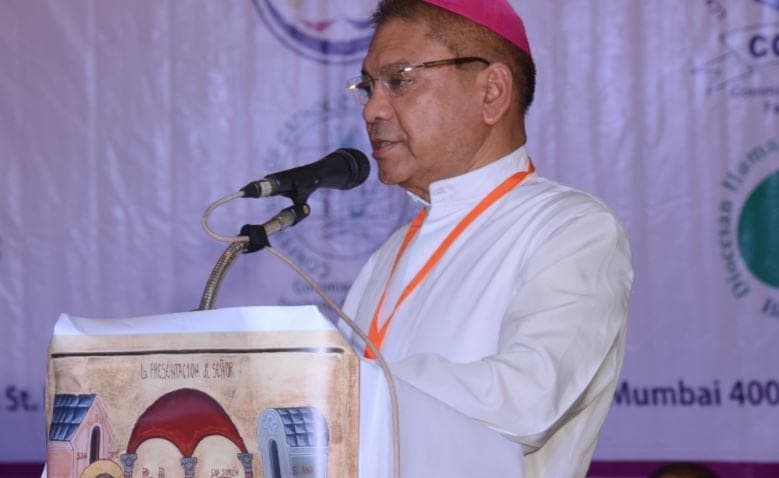MUMBAI, India – Although Amoris Laetitia has caused controversy over what it says – or doesn’t say – about divorced and remarried people receiving Communion, one archbishop in India is pointing to an area that he says the papal document on marriage and family life has almost entirely ignored.
Archbishop Felix Machado of Vasai said he was “disappointed” the document didn’t really discuss interfaith marriages – where one of the parties isn’t baptized – adding he “expected some clear light” on the subject.
“However, I find only a passing mention made about the phenomena of the increasing number of interreligious marriages,” Machado said during a symposium on Amoris Laetitia in the context of India held in Mumbai from October 13-15.
RELATED: Cardinal Gracias says “hedonistic culture” and “atheistic ideologies” threaten families
Machado is a former Vatican official, serving as the Under-Secretary of the Pontifical Council for Interreligious Dialogue from 1999-2008.
Although truly interreligious marriages are not as common in Western Europe and the Americas, they are happening with increasing frequency in places where Christians are a distinct minority, especially in Asia.
The archbishop warned against being prejudiced against interreligious marriages, stating that although such marriages are not ideal, Catholics should note where Pope Francis says people should not be trapped in lamenting the situation a couple find themselves but remember that for all a family’s problems, it can always grow, “beginning with love.”
“It is also a fact that a number of interreligious marriages have been successful while, it is also true that a good number of the so-called ‘regular’ marriages – between Christian spouses – have also failed. Obviously, I am not recommending for interreligious marriages but simply asking for their acceptance when they do take place,” Machado said.
The archbishop then notes that in Amoris Laetitia, Francis speaks about two ways of thinking which recur throughout the Church’s history: Casting off and reinstating.
“The Church’s way is the way of mercy and reinstatement… not to condemn anyone forever; there is a need to avoid judgments which do not take into account the complexity of various situations and to be attentive, by necessity, to how people experience distress because of their condition,” Machado said.
RELATED: Bishops of India host meeting to combat threats to secularism
Another issue Machado discussed – which is predominantly a situation that only happens on the Indian subcontinent – is the phenomenon of inter-caste marriage.
India’s caste system places people in different social classes, based upon birth. Although based upon the Hindu faith, it affects the social life of people in other religions, including Christians.
In the caste system, marriage between members of different castes is forbidden.
Although caste isn’t recognized in the Christian faith, many Christians still hold to caste distinctions in their social life.
Machado said the Church teaches this is “morally wrong and a scandal,” but acknowledges “the discriminatory caste mentality which is deeply embedded in our Indian blood.”
The archbishop said when it comes to one’s own family member wanting to get married outside of his or her caste, the reaction against the marriage is almost always very strong, if not violent.
“I consider it a mortal sin if efforts are made to interfere in a relationship between two Catholic partners who belong to different castes, thereby trying to dissuade them to contract a marriage because of the caste differences. Unfortunately, there do exist quite a few such rejected families,” Machado said.
“Yes, there are ethnic and cultural differences in inter-caste marriages. These differences can provide the partners motivation for seeing them as occasions of growth; in other words, differences can become occasions for mutual growth,” he pointed out.
RELATED: Religious leaders in India gather to preach non-violence, world peace
Machado was quick to point out the positives of married life in India.
The archbishop said much of Amoris Laetitia discusses the “rapidly sweeping ideology of secularism” in the Western world, against which Machado said the families of India have been relatively resilient.
He credits the religious traditions and cultural integrity in India for this protection against the “onslaught of attacks on the family.”
“Thanks also to the mutual influence of the multi-religious and multi-cultural Indian situation, Christian families continue to live a stable and positively enriched married and family life,” Machado said.
“In India we do experience how, to a greater extent, the values that the pope speaks of, are still strong in many families: a family made up of parents, grand-parents, brothers and sisters, aunts and uncles, cousins and even neighbors,” the archbishop said, noting that the larger family includes fathers-in-law, mothers-in-law and all the relatives of the couple.
“Obviously, these relatives, Pope Francis warns, must not be seen as competitors, threats or intruders. The couple must maintain their legitimate privacy and independence,” Machado said.
















